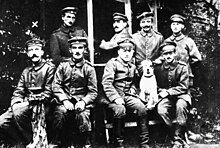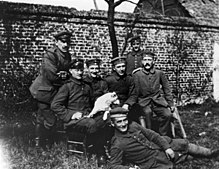Hitler served in France and Belgium in the 16th Bavarian Reserve Regiment, on the Western Front as a regimental runner. He was present at a number of major battles on the Western Front, including the First Battle of Ypres, the Battle of the Somme, the Battle of Arras and the Battle of Passchendaele.[35]
Hitler was twice decorated for bravery. He received the relatively common Iron Cross, Second Class, in 1914 and Iron Cross, First Class, in 1918, an honour rarely given to a Gefreiter.[36] Yet because the regimental staff thought Hitler lacked leadership skills, he was never promoted to Unteroffizier (equivalent to a British corporal). According to Weber, Hitler's First Class Iron Cross was recommended by Hugo Gutmann, a Jewish List adjutant, and this rarer award was commonly awarded to those posted to regimental headquarters, such as Hitler, who had more contact with more senior officers than combat soldiers.[37]
Hitler's duties at regimental headquarters gave him time to pursue his artwork. He drew cartoons and instructional drawings for an army newspaper. In 1916, he was wounded in either the groin area[38] or the left thigh[39] during the Battle of the Somme, but returned to the front in March 1917. He received the Wound Badge later that year. German historian and author, Sebastian Haffner, referring to Hitler's experience at the front, suggests that he had at least some understanding of the military.
On 15 October 1918, Hitler was admitted to a field hospital, temporarily blinded by a mustard gas attack. The English psychologist David Lewis and Bernhard Horstmann suggest the blindness may have been the result of a conversion disorder (then known as "hysteria").[40] In fact, Hitler said it was during this experience that he became convinced the purpose of his life was to "save Germany." Some scholars, notably Lucy Dawidowicz,[41] argue that an intention to exterminate Europe's Jews was fully formed in Hitler's mind at this time, though he probably had not thought through how it could be done. Most historians think the decision was made in 1941, and some think it came as late as 1942.
Hitler had long admired Germany, and during the war he had become a passionate German patriot, although he did not become a German citizen until 1932. Hitler found the war to be "the greatest of all experiences" and afterwards he was praised by a number of his commanding officers for his bravery.[42] He was shocked by Germany's capitulation in November 1918 even while the German army still held enemy territory.[43] Like many other German nationalists, Hitler believed in the Dolchstoßlegende ("dagger-stab legend") which claimed that the army, "undefeated in the field," had been "stabbed in the back" by civilian leaders and Marxists back on the home front. These politicians were later dubbed the November Criminals.
The Treaty of Versailles deprived Germany of various territories, demilitarised the Rhineland and imposed other economically damaging sanctions. The treaty re-created Poland, which even moderate Germans regarded as an outrage. The treaty also blamed Germany for all the horrors of the war, something which major historians such as John Keegan now consider at least in part to be victor's justice; most European nations in the run-up to World War I had become increasingly militarised and were eager to fight. The culpability of Germany was used as a basis to impose reparations on Germany (the amount was repeatedly revised under the Dawes Plan, the Young Plan, and the Hoover Moratorium). Germany in turn perceived the treaty, especially Article 231 on the German responsibility for the war, as a humiliation. For example, there was a nearly total demilitarisation of the armed forces, allowing Germany only six battleships, no submarines, no air force, an army of 100,000 without conscription and no armoured vehicles. The treaty was an important factor in both the social and political conditions encountered by Hitler and his Nazis as they sought power. Hitler and his party used the signing of the treaty by the "November Criminals" as a reason to build up Germany so that it could never happen again. He also used the "November Criminals" as scapegoats, although at the Paris peace conference, these politicians had had very little choice in the matter.
Legacy
-
Warfare
Further information: Napoleonic weaponry and warfare and Military career of
Napoleon Bonaparte
[image: Photo of a grey and phosphorous-coloured eque...
14 years ago



0 comments:
Post a Comment